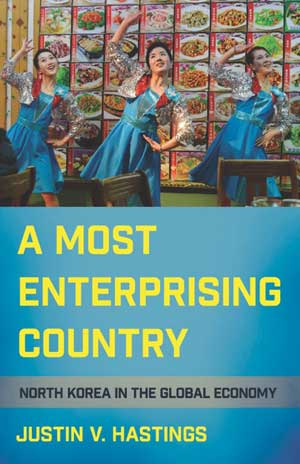
A Most Enterprising Country asks why North Korea still exists, and locates the country’s survival in its economy’s interconnectedness with the global economy. It argues, while overall, North Korea remains a disaster in all dimensions—socially, economically, and politically—both for its own population and for East Asia, North Korean trade networks have been surprisingly effective. The networks have shown surprising resilience despite (or perhaps because of) their ambivalent reception by the North Korean central state, and throughout the fraught relationship between North Korea and the rest of the world.
For many average North Koreans, trade allows them to survive, or even to acquire lifestyles that the state is unable to provide. For the North Korean state, trade networks are partially responsible for keeping elites in power. The networks are effective because, at the most basic level, North Korean businesspeople are ruthlessly pragmatic and adaptable. They operate with something approaching Darwinian economic logic, as if their survival were at stake, because it often is.
Paradoxically, the harsh political and economic environment that North Korean enterprises experience both overseas and within North Korea, encourage pragmatism, as ideological trappings are stripped away. North Koreans at all levels have been forced by their circumstances to become entrepreneurial. From the 1970s onward, North Korean officials posted overseas were expected to provide both for themselves and for the regime back home, by whatever means necessary. From the 1980s, state companies received permits to engage in foreign trade.
In the face of the famine and the collapse of the formal economy in the 1990s and early 2000s, private citizens were also forced to become entrepreneurial in order to survive, leading to the private markets that sprung up across the country. Hybrid trading networks that mixed private agency and state resources, in turn, emerged from state and private entrepreneurialism by providing goods for the private market through the co-optation of state actors.
State entities themselves have also become hybrid entrepreneurs as they have been forced to provide for themselves and the state, and as state officials have used their positions to engage in creative private income generation even as the formal economy broke down. These networks are highly risk-acceptant, and have become experts at operating in the blurred zones between licit and illicit, or between formal and informal trade, at least as defined by the outside world. They are adept at identifying and operating in jurisdictions that provide a combination of technological development, logistical connections, market and nonmarket ties to foreign trade networks, and friendly (or at least neutral) political and legal environments.
While the central state can shape the contours of the trade—by selectively cracking down on or ignoring market activity in North Korea, and by giving out licenses for formally permitted trade overseas—and can profit from trade through imported goods, bribes, taxes, fees, and loyalty payments up the food chain, the extent to which it actually controls what happens on the ground to any but the most centrally directed networks is unclear. North Korea’s economy has long since ceased to be something tightly controlled by the central government.
My first book, No Man’s Land, showed how and when geography and the technologies that we generally associate with globalization—cheap and fast transportation, containing shipping, the Internet, mobile phones, and the like—affect the ability of terrorist groups, organized crime syndicates, and insurgencies to operate. In writing that book, I saw the economic networks that undergirded clandestine groups—terrorists and insurgents survive and are able to blow things up in part by being good businessmen—and wondered what it would look like if an entire country operated through black and gray markets. That led me to North Korea, a country that has survived in large part through taking advantage of globalization with international trade that straddles the line between legal and illegal.
Because no country is truly unique, how North Korea’s economy has developed over the past several decades is reminiscent of the changes seen in China and countries in the Communist bloc in the 1980s. China famously began economic reforms in 1979 that saw a large number of privately run, state-owned companies come into existence while the economy was still officially centrally planned. Eastern European Communist countries also developed ‘second economies’—private economic activity that was often tacitly encouraged by the state to provide a safety valve for the inevitable failings of command economies.
North Korea differs from China in that North Korean officials in general refuse to call what’s happening in the country ‘reform.’ The changes in North Korea have often occurred without any official government sanction or control, and it is not clear to what extent the North Korean state would actually be able to stop the country’s entrepreneurs even if it wanted to. It differs from Eastern European ‘second economies’ because it has stumbled upon this new status quo in an age of globalization. North Korea’s second economy actually depends on trade and interconnectedness with the global economy in a way not typically associated with closed-off, planned economies.
North Korean restaurants are tourist attractions in many cities, and are often the closest the average person will ever get to North Koreans. And indeed, they were one of the inspirations for the book. Toward the beginning of my research, I came across a North Korean restaurant in a city in northeastern China. The restaurant itself was a block or two down from a branch of a popular South Korean coffee, waffles, and ice cream chain, indicating that perhaps North Koreans were not as isolated (even from South Koreans) as one would think. The façade of the restaurant was festooned with a giant North Korean flag, and advertised—in Chinese—the fact that it sold dog meat. The North Koreans had clearly established a niche for themselves that Chinese and South Korean restaurants were wary of (publicly) occupying. In its restaurants, North Korea is essentially using its ‘brand’—isolated and exotic—to make money.
If we take a step back, the whole idea of a North Korean restaurant seems a bit odd. What kind of a paranoid Stalinist country runs its own international restaurant chain? The book’s third chapter goes into depth about these restaurants, which are sprinkled throughout Asia, particularly China. Many different North Korean companies have set up a variety of different business arrangements, from wholly owned restaurants to joint ventures with local companies, through to hiring out waitresses to regular Chinese restaurants to attract business. The restaurants themselves are usually decorated with North Korean art, and the waitresses generally present a song and dance routine every evening for customers (with a combination of North Korean patriotic songs and Western rock songs).
The waitresses themselves are daughters of the elite, and often have several years of training in North Korea. They can, within limits, indicate their preferences about where to work. They live near the restaurant under the watchful eye of minders. They are not allowed to interact with local people, are often mistreated, and occasionally attempt to escape, but the fact that many of them sign up seemingly voluntarily suggests that they must make a terrible choice between living and eating in China, or not necessarily having anything to eat in North Korea. The existence of the restaurants is an example of both the entrepreneurial nature of North Koreans, and the difficult choices they must make to survive.
The enterprising nature of North Korea’s trade networks cuts both ways. It is a testament to the resilience of average North Koreans who have found creative ways to survive under terrible conditions. But it also shows how the North Korean state has been able to ‘flourish,’ inasmuch as state trading networks have been able to evade sanctions and other attempts to stop Kim Jong-un from profiting off the population’s suffering. Even as sanctions have tightened with every nuclear or missile test, Pyongyang has experienced a building boom, the North Korean won and food prices in the capital appear to be stable, and the North Korean economy seems to growing at a very modest clip.
This has several implications for how we think about North Korea. The old view of North Korea as Communist, paranoid, totalitarian, and cut off from the world is not really accurate, and is not particularly useful in dealing with the country. The population of North Korea is increasingly untethered from the state in terms of its survival. North Korea is unlikely to collapse solely due to economic catastrophe, and waiting for the regime to fall is not a viable long-term strategy. At the same time, precisely because North Korean trade networks have been so enterprising, Kim Jong-un may be prone to riskier behavior, inasmuch as he is freed from the need to provide for the population, and is confident that state-owned companies can evade any sanctions thrown at them. The end of North Korea is likely to come more from political challenges and outside pressure than economic tribulations.


Justin Hastings is Associate Professor in International Relations and Comparative Politics and an Australian Research Council Future Fellow at the University of Sydney. He is also the author of No Man’s Land: Globalization, Territory, and Clandestine Groups in Southeast Asia (Cornell University Press, 2010).